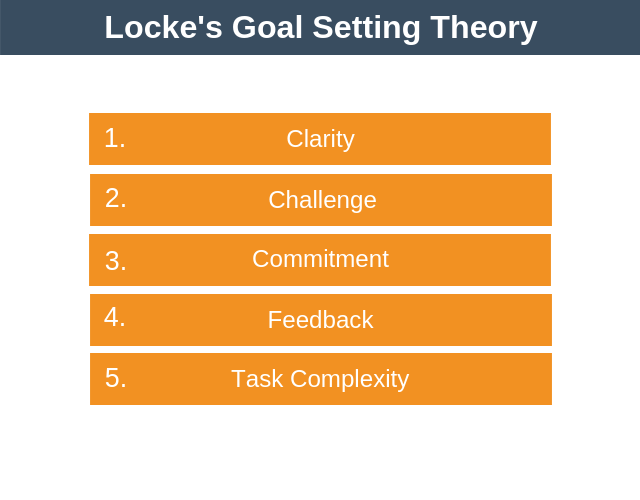Locke’s goal-setting setting theory is a research-based theory that was introduced by Edwin Locke in mid-1960. Locke created and refined his objective setting theory during the 1960s, distributing his first article regarding the matter, “Toward a Theory of Task Motivation and Incentives” in 1968.
So, Locke’s goal-setting theory provides the blueprint to make setting meaningful and challenging goals which you can achieve. He has done years of research to demonstrate what types of goals are more achievable and how we should set meaningful goals.
Locke’s goal-setting theory is useful for personal as well as professional goal-setting processes. So here we are going to learn about Locke’s goal-setting theory.
WHAT’S IN IT
Brief Introduction
Meanwhile, Locke’s goal-setting theory states that the goal setting is directly linked to task
performance. It means that if we have clarity in goals then we can have enough motivation to
achieve those goals.
Likewise, it includes that particular and challenging goal alongside appropriate feedback
leads to higher and better exhibitions. So, If you are a manager of the company and you want
to set a goal for your employee for growth of the company then you should clearly mention
how much time and how much growth you want from them. For eg, 15% growth next year.
This is specific and also challenging.
Why Goal Setting Improves Performance

Also, According to Locke’s goal-setting theory, there are some reasons behind why goal setting improves the performance of the individual as well as organization. So, It has clearly seen that companies and individuals who have some set of meaningful goals are more productive and successful. Meanwhile, Good goal setting helps to improve performance. Some of the reasons why goal nesting improves performance are given here.
1. Meaningful Goals attract attention and keep us away from distraction
Meanwhile, Proper goal setting attracts our attention toward our goals and keeps us away from all those distractions which may distract us from the goal. Hence, Goals give us the feeling of responsibility to do work for something we want to get. For example, if you want to achieve A+ in an exam then you may be distracted by other extracurricular activities like playing games, watching movies etc. But if you set the goal then you cannot distract yourself rather your goal attracts you to achieve that.
2. Goals Energies Us and Push to Work Harder
So, The goals are associated with any reward. If you get good marks in exams you get a reward. If you do a good performance in your job then also you can get a reward. So with the completion of a goal, there is a feeling of achievement. Meanwhile, Locke’s goal-setting the theory says that if we work harder we can achieve that reward. Also, Goals energize us and push us to work harder so that we can achieve the reward which we want from that goal.
3. Helps to Discover New Innovative Way for Accomplishment
So, If we set the goals, I already said that it will motivate and energize us to achieve them. So, during the process of achieving the goals, many obstacles and problems can arise. So, Locke’s goal-setting theory says that, if you have a proper goal setting process then you fight with those obstacles to achieve your goal and to overcome those obstacles you will search for new innovative ways.
4. Makes aware of your potential
We all have the potential to achieve something but many of us haven’t discovered yet. Hence, If we set the goal and achieve them then it will give us the confidence to set more challenging goals. So, It will show us the real potential of what we can achieve. If we discover what our real potential is then we can achieve as many goals as we want to achieve, which helps to improve our performance.
5 principles of Goal Setting
Hence, In Locke’s theory of goal setting, he has delivered five principles of goal setting. So, He has done research on why goal setting works so well on some people and not so much for others so that he can optimize the goal-setting process for everyone. Hence, According to him, we should use these five principles before setting any goals. Further, I mean to say that good and achievable goals must have these qualities on them. The five principles that he has discovered in his theory are:
- Clarity in goals
- Challenging goals
- Commitment in goals
- Proper feedback
- Task complexity

1. Clarity in goals:
Loke’s theory of goal setting suggests that to make our goal achievable we should make them clear. So, Many people set the goal to lose weight. But this kind of goal will never be achieved because we cannot measure the progress of goals. So, The goal should be clear and specific. If you want to make a goal regarding weight loss then set the goal like “ I will lose 30KG in 1 year”.
Hence, In this type of goal, you can see the clear path of what you have to do to achieve that goal. Here are some tips to make your goal clear.
1. So, Use SMART mnemonic to set the goals. SMART stand for:
● Specific: Goal should clearly tell you what, why and how you ctually want to achieve.
● Measurable: Hence, You must be able to measure your goals. How much they have been achieved and how much is left to be achieved.
● Achievable: Some set the goals which need too much effort to work on them. So, Those not achievable goals. Those goals only made you suffer. So avoid those goals rather you should set the goals whose you can clearly see the results.
● Relevant: So, Goals should be relevant. If you are setting goals for any organization then you should also be aware of how your goals are valuable for the organization.
● Time-Bound: Hence, Your goal should have a specific deadline for the completion of the goal. For eg, six months, one year, two years etc.
2. Make a proper plan on how you are going to achieve them.
3. Ensure you will measure your goals in a particular period of time.
2. Challenging Goals
Locke’s goal-setting theory states that more the challenging theory the chances of achieving them is also high. Compared to mediocre goals, challenging goals are more motivating. So, Here challenging goals doesn’t mean not achievable goals. So, We already discussed that according to SMART technique we should always set achievable goals. Challenging goals are those goals which give you more motivation and dedication to achieve them not those which completely wipe you down.
How to set challenging goals?
● Ask genuinely yourself what your goal is too much easier or too simple to achieve?If yes then make sure you should set little more challenging goals but don’t make it enough challenging.
● If the goal is a group goal then set up a competition type of thing among the team members and also set any reward. This motivates every team member to push their limit further and do more challenges.
● Think about the potential obstacles and problems of having the capacity to wipe you out from your journey and plan how you are going to push through these problems.
3. Commitment to goals
To motivate yourself and to achieve goals you must be committed to your goals. Make sure you will make those goals in which you are committed to achieving those goals.
If you are setting goals for the team then you and every member of your team should agree on that goal if not then you have to make them agree and commit.
For eg. committed goals, if you make a team to achieve some goal and you put all the work pressure on your team then it will not be the committed goal but if you and your team member equally work then it is a committed goal. That’s what Locke’s goal-setting theory said about a commitment to goals.
How to be committed to goals?
● Keep yourself in the path by visualizing what your goal means to you if you achieve it.
● Make sure goals are sensible and realistic so that your team members agree with the goal.
4 Proper Feedback

Locke’s theory of goal setting states that if you provide good feedback to your goal then it will increase the motivation to achieve the goal. If you are working in a team then in a certain period of time you should give feedback which can help to gauge your progress. The feedback should be regular and both the negative and positive feedback are welcomed.
If there is any negative feedback then try to improve on that. How to give/ receive feedback properly?
● If you are working in a team then organise the meeting on a weekly basis and discuss the goal and receive and give feedback
● Develop confidence to ask others for their feedback. Ask like, “How am I doing this?”
● Self-generated feedback mechanism must be designed. There are different apps and software to do so. For eg, Strides.
5 Task complicity
Task complicity is also one of the greater factors of goal setting. If the goal is too complex then it will be difficult to achieve, Highly complicated tasks demotivate and wipe you out from the journey of achieving meaningful goals. So it is necessary to make tasks simple and non complex, according to Lock’s goal-setting theory.
Tips on task complicity
● Make sure you enjoy your goals. If you are getting stress from your goal then reconsider about it
● If you set any complex task then provide it more time than others task
Involvement of Employee in Goal setting: What theory said
According to Locke’s theory of goal setting, the involvement of employees has mixed results. It
has both positive and negative impacts.
❏ The Negative Side: If an employee is involved in goal setting then employees try to set
less challenging goals which eventually affect the performance of the organization
❏ The positive side: If employees are involved in goal setting, then it is easier for
management to get goals accepted as employees are participating in the process of
goal setting.
Locke finds out that Locke’s goals setting theory is culturally bound. This means it doesn’t
work in every country and culture in the world. It was developed and adapted in the country
like the USA and Canada where people are independent and seek challenging goals to grow.
It may not work in those countries where people are interdependent and they try to skip challenging goals and look for shortcuts.
Conclusion
Locke’s goals setting theory believes that if you set challenging goals and also provide
proper feedback then the motivation to complete your goals will be increased. For that, he
suggests we should make our goals clear using the SMART rule. SMART goals help to avoid
those mistakes which can become an obstacle in your goal setting. Further theory suggests
the goals must have five principles which we have already discussed before.
Also you can read our blog on File Management- Managing Electronic Files Organizing & Computer Files
FAQ’s
Edwin Locke proposed the theory of goal setting as Locke’s theory of goal setting. He
published his first article in this subject in 1968 by the name “Toward a Theory of Task
Motivation and Incentives.”
Locke’s goal setting theory is useful to set challenging and productive goals for you and your
organization. But Locke’s goal setting theory is culturally bound theory. It is said that it works
perfectly in a country where people are independent and seek challenging goals but it
doesn’t work in a country where people are interdependent and skip challenges.
expectancy theory?
Goal setting theory belief that individuals are motivated by challenging tasks with proper
feedback. It has not any guarantee of success. But in expectancy theory individuals are
motivated by projects where the success rate is high.
Equity theory is based on individuals’ perceptions about how fairly they are treated compared
with their coworkers whereas in other hand goal setting theory state that employees are
motivated with challenging tasks and proper feedback given to them on the frequent basis.
Goal setting theory belief that motivation in employee comes with the challenging task and
the proper feedback to them, but reinforcement theory belief that desired motivation come on
employee by the means reinforcement, punishment and extinction.



